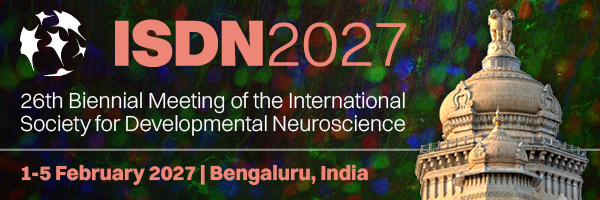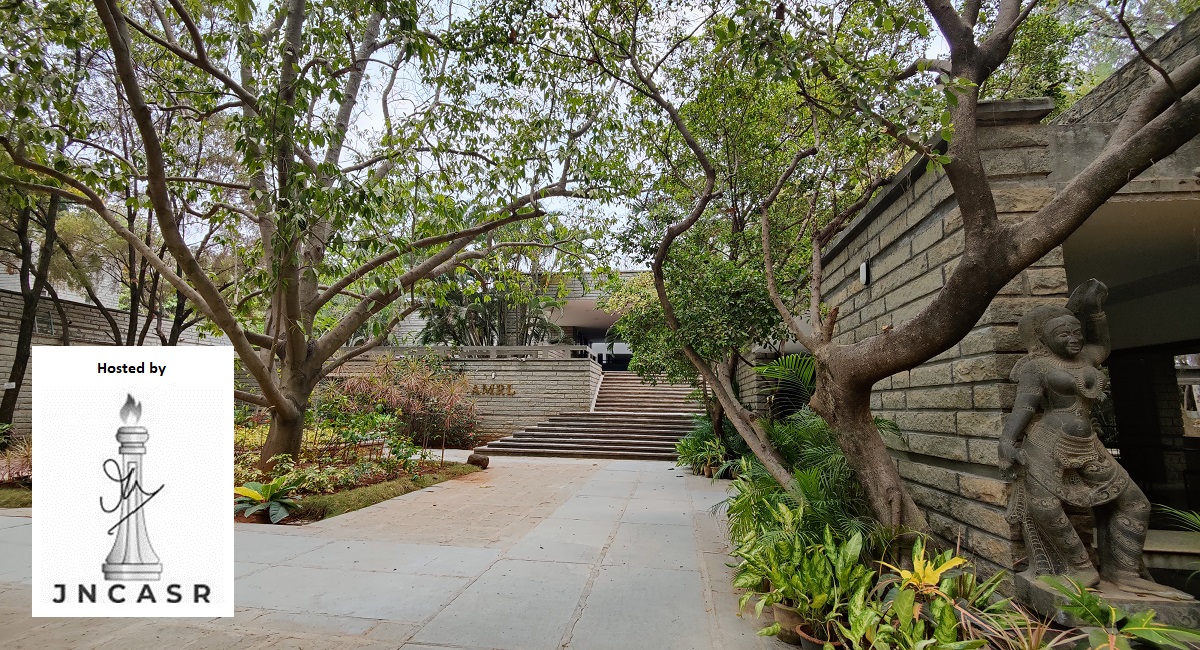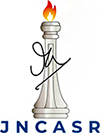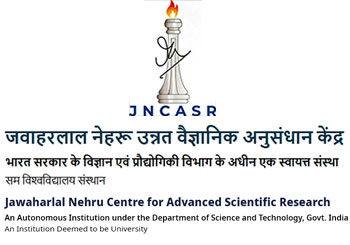Other Drives/Programmes
Primary tabs
Conference Website: https://www.isdnsociety.org/
International Conference in Developmental Neuroscience coming second time in India, and first time ever in Bengaluru! An exciting and diverse scientific programme will feature plenary talks and invited speakers highlighting recent advances and future directions in fundamental and applied developmental neuroscience. We will also showcase cutting-edge international research selected from submitted abstracts, with prizes awarded to the best posters presented by trainees. More details to follow...
We welcome your participation and look forward to meeting you in Bengaluru.
Scientific Committee
Achira Roy ISDN 2027 Local Chair
Jawaharlal Nehru Centre for Advanced Scientific Research, India
Karine Loulier ISDN Secretary-General and ISDN 2027 Co-chair
Institut des Neurosciences de Montpellier, France
Tomomi Shimogori ISDN President, RIKEN Center for Brain Science, Japan
Shubha Tole ISDN Past President, Tata Institute of Fundamental Research, India
Stefano Stifani IJDN Editor-in-Chief, Montreal Neurological Institute-Hospital, McGill University, Canada
Pierre Leprince ISDN Treasurer, University of Liège, Belgium
Denis Jabaudon, University of Geneva, Switzerland
Zeljka Krsnik, University of Zagreb, Croatia
Goichi Miyoshi, Gunma University, Japan
Vibhu Sahni, Burke Neurological Institute, USA
Yan Song, Peking University, China
Tanja Vogel, University of Freiburg, Germany
 ,
,

The 77th Republic Day was celebrated at the Centre on 26th January 2026 with patriotism and great reverence. The flag post located in front of the administrative building was decorated with colorful flowerpots.
The National flag was hoisted by Prof. Umesh V Waghmare, President, JNCASR at10:00 hrs. Bharat Ratna Prof. CNR Rao and Mrs. Rao witnessed the Republic Day celebration. The National anthem was sung by the cultural group of students followed by Vande Mataram and patriotic songs. Over 400 faculty, students, and staff participated in the Republic Day celebration.
The Rashtriya Karmayogi “Seva Bhav” one day training programme was conducted in two batches at Jawaharlal Nehru Centre for Advanced Scientific Research (JNCASR), Bengaluru on the following dates.
- Dec. 18, 2025
- Jan. 20, 2026
Master Trainers/ Karmayogi Facilitators Mr. Srinivas S, Sr. Technical Officer, Dr. E. Nandakumari, Sr. Library cum Information Asst. Gr. I and Dr. Jaishri Sanwal Bhatt, DST Research Scientist successfully conducted the one-day training program.
A total of 71 regular employees (non-teaching staff) enthusiastically participated in the training program. All the participants successfully completed the program and the certificates were downloaded.
International Conference on Metal-Organic Frameworks and Porous Organic Polymers for Energy and Sustainability (MOFES’26)
Conference webpage: https://www.mofes26.com/ For Contact: mofes@jncasr.ac.in
About the conference:
First edition of MOFES’26 - the Conference on Metal-Organic Frameworks and Porous Organic Polymers for Energy and Sustainability, to be held from 12.01.2026 to 15.01.2026 in Jawaharlal Nehru Centre for Advanced Scientific Research (JNCASR), Bangalore, India. MOFES’26 marks the launch of a new platform highlighting the growing momentum and global interest in functional porous materials. This event aims to catalyze the exchange of ideas and the advancement of novel applications of MOFs and POPs, especially in the domains of energy conversion, storage, and sustainability-driven innovations. In this rapidly expanding field, MOFES’26 targets to promote interdisciplinary collaboration across academia and industry, fostering innovative ideas and impactful research. This conference will feature an exciting scientific session, including Plenary, Keynote, and Invited lectures from internationally recognized scientists, industrial partners, aiming to cover latest developments in the broad field of porous materials, including synthesis and structural design, advanced characterisations, catalysis, energy conversion, storage and environmental remediation and scale-up and real-world applications. Additionally, we are proud to host several industrial delegates, highlighting the challenges and opportunities in translating academic research into industrial solutions. The MOFES’26 organising team is committed to reflecting an inclusive, diverse, and welcoming environment throughout the conference by upholding the values of gender balance, inclusivity, and respect for all identities and perspectives.
Conference Topics:
- Synthesis and Functionalization of MOFs and POPs
- Characterisation and Modelling
- Energy Conversion and Storage
- Membranes and Molecular Separations
- Environmental Sustainability
- Catalysis and Chemical Transformations
- Emerging Technologies and Industrial Applications
Directorate of Parliamentary Affairs, Rajbhasha & Organization and Methods (DPARO&M), DRDO HQ, New Delhi- 110011 requested Technical Papers in Hindi for "Third All India Technical Rajbhasha Sammelan". The Seminar was held at Naval Physical & Oceanographic Laboratory (NPOL), Kochi on 10-11 January, 2026.
In this connection, Dr. Jaishri Sanwal Bhatt, Research Scientist, Geosciences Unit of our Centre has presented the Article on the subject of "Tsunami Security of India: Integrating Long-Term Geological Evidence for National Development" for the above sammelan. Amongst all the DRDO presentations, Dr. Jaishri Sanwal Bhatt got the Award for the Best Presentation.
Frontiers in Multiscale Modeling of Molecules, Materials & Biomaterials
Conference Webpage: https://sites.google.com/view/aqt-mtm25/home For contact: fm4b2026@gmail.com
About the conference:
On the occasion of completing 25 illustrious years of the ‘Advanced Quantum Theory: Molecules to Materials’ (AQT-MTM) group, a silver jubilee conference titled ‘Frontiers in Multiscale Modeling of Molecules, Materials and Bio-Materials’ is being organized. This event aims to bring together a wide spectrum of topics in theoretical and computational sciences, spanning the domains of physics, chemistry, engineering, and biology. The primary objective of the conference is to unite various aspects of computational and theoretical sciences under a single umbrella. It seeks to bridge the quantum and classical regimes, covering systems from molecules to materials including bio-materials, and methodologies from Density Functional Theory (DFT), Quantum Many-body Methods (QMBM) to Molecular Dynamics (MD), as well as studies ranging from equilibrium to non-equilibrium phases.
The conference will feature a wide range of cutting-edge talks, including:
-
Materials modeling for energy-related research, with a special emphasis on thermoelectric materials and electrode/electrolyte design for battery applications.
-
Catalytic conversion of value-added products in both homogeneous and heterogeneous systems, focusing on discovering thermodynamically or kinetically favorable pathways. These catalytic studies encompass a wide range, spanning from frustrated Lewis pairs to single-atom and di-atom catalysts, and from spinel and other three-dimensional structures to organometallic complexes
-
Light–matter interactions, examining transformations from physical changes to chemical conversions, with a focus on excited-state dynamics within the photophysical regime, and photochemistry leading to the generation of value-added products.
-
Modeling Quantum (many-body) systems in both equilibrium and non-equilibrium settings, addressing topics, such as Majorana fermions, non-hermitian matrices and frustrated quantum spin systems and quantum transport, pushing the boundaries from molecule/quantum dot to the condensed matter systems.
-
MD simulations, at both classical and ab initio levels, to investigate biomolecular interactions with external surfaces and electrode–electrolyte interfaces. These MD simulations aim to enhance energy storage and harvesting technologies and include the development of accurate force fields for MD simulations.
-
A notable and emerging dimension of the conference is the integration of Artificial Intelligence (AI) and Machine Learning (ML). The ML applications help uncover key governing parameters and predict efficient materials across the diverse research areas discussed.
Overall, this conference is the first of its kind, uniquely bringing together diverse fields; from condensed matter physics to computational materials science, under one roof to foster interdisciplinary collaboration and showcase state-of-the-art theoretical and computational research.
Conference_Schedule.pdf
To commemorate the day of adoption of the Constitution of India. As a part of the celebration, reading of the Preamble to the Constitution of India was organized on November 26, 2025, at 11.00 A.M. at Admin Foyer.
Indo-French Workshop on Navigating Rugged Landscapes (NRL): Machine learning approach to dynamics and enhanced sampling in disordered systems, and statistical physics approaches to machine learning
Workshop Webpage: https://sites.google.com/view/nrl2025
About the Workshop:
The workshop aims to bring together experts working in seemingly different domains of glassy dynamics, biophysics, and machine learning to address the common underlying threads; investigating the rugged landscape to learn the behavior of dynamical systems. This will lead to an exchange of ideas across domains, focussing on cross-cutting themes such as similarities between the loss landscapes of machine learning and glassy landscapes, relationships between the stability of neural networks to adversarial attacks and the perturbation in glassy landscapes, use of generative models for out-of-distribution samples for enhanced sampling of rare events, and characterization of glass structure and dynamics by learnable and interpretable low-dimensional features. The workshop will systematically address these questions and initiate discussions to identify the key problems to be addressed.
The talks will be broadly organized around the following themes:
Theme I: Machine learning investigation of glasses and other disordered systems
Theme II: Enhanced Sampling with Machine Learning
Theme III: Statistical Physics of Machine Learning
The three-day Training Programme for Karmayogi Coaches (Master Trainers), organized under Phase II of the Rashtriya Karmayogi – Large Scale Jan Seva Programme in partnership with the Department of Science and Technology (DST) and the Capacity Building Commission (CBC), was successfully completed at Jawaharlal Nehru Centre for Advanced Scientific Research (JNCASR), Bengaluru, from 17 to 19 November 2025. The training sessions, led by a team of DST experts lead trainers, focused on leadership development, organizational transformation, communication strategies, and citizen-centric governance, while inspiring values of empathy, integrity, and Seva Bhav in public service. Participants from various institutions across Southern and Western India actively engaged in collaborative learning and shared meaningful insights towards advancing a responsive governance culture. The programme concluded with a renewed commitment to strengthening the nation’s capacity-building ecosystem by empowering Karmayogi Coaches as catalysts for change within their respective organizations. JNCASR thanks all trainers, participants, and support staff volunteers of the Centre for contributing to the success of this national initiative.
- Back to previous page
- |
-
Page last updated date:27-02-2026 05:48 PM























